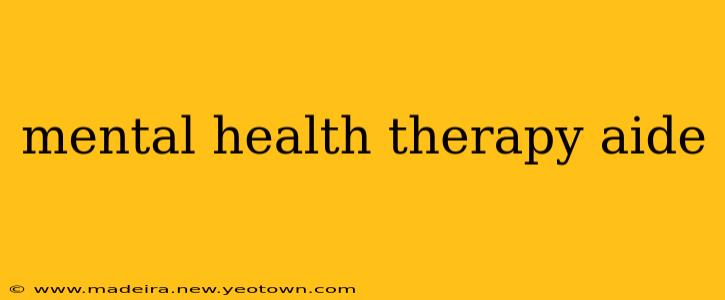The quiet hum of the office, the gentle rustle of papers, the soft murmur of conversation – these are the sounds that often accompany a day in the life of a mental health therapy aide. But beneath the surface calm lies a demanding, rewarding, and profoundly impactful role. It’s a career path that requires empathy, patience, and a genuine desire to help others navigate the complexities of mental health. This isn't just a job; it's a vocation, a calling to assist individuals on their journey towards healing and well-being.
My own journey into this field began with a simple desire to make a difference. I'd witnessed firsthand the struggles of loved ones grappling with mental health challenges, and I felt a deep urge to be part of the solution. This led me to explore the world of mental health, eventually landing me in the fulfilling role of a therapy aide.
What Does a Mental Health Therapy Aide Do?
A mental health therapy aide acts as a crucial support system within a therapeutic setting. Our responsibilities are diverse, ranging from direct patient care to administrative tasks. We are the unsung heroes, often the first point of contact for patients, and play a vital role in creating a safe and supportive environment.
We aren't therapists; we don't provide diagnoses or lead therapy sessions. Instead, we assist licensed therapists and other healthcare professionals in delivering comprehensive care. This can involve a wide array of tasks, including:
- Direct Patient Care: This could involve anything from accompanying patients during group sessions to providing emotional support and encouragement. We help foster a sense of community and shared experience among patients.
- Administrative Duties: Organizing patient files, scheduling appointments, managing communication—these are essential tasks that ensure the smooth operation of the therapeutic practice.
- Maintaining a Safe Environment: Creating a calming and structured environment is crucial for patients' well-being. We help maintain order, ensure safety protocols are followed, and assist in emergency situations.
- Observation and Reporting: We closely observe patients and report any significant changes in their behavior or emotional state to the therapist, helping to ensure the effectiveness of the treatment plan.
What Kind of Education or Training is Required to Become a Mental Health Therapy Aide?
What educational requirements are needed to become a mental health therapy aide? The educational requirements for a mental health therapy aide vary depending on the specific setting and employer. Some positions may only require a high school diploma or GED, while others may prefer candidates with some college coursework in psychology or a related field. However, on-the-job training is often a significant component of the role. Many employers provide comprehensive training programs that cover relevant topics such as mental health disorders, patient interaction techniques, and crisis intervention. Certification in CPR and first aid is frequently a requirement.
What Are the Daily Responsibilities of a Mental Health Therapy Aide?
What are the daily responsibilities of a mental health therapy aide? A typical day can be quite varied, depending on the setting (inpatient, outpatient, community-based) and the specific needs of the patients. A day might involve preparing the therapy room for group sessions, assisting patients with activities, documenting observations in patient charts, answering phones, or even helping patients with practical tasks, such as making appointments or arranging transportation. Flexibility and adaptability are key to success in this role.
What are the Career Advancement Opportunities for Mental Health Therapy Aides?
What are the career advancement opportunities for mental health therapy aides? A career as a mental health therapy aide can be a stepping stone to further advancement in the mental health field. With experience and additional education, many aides progress to become certified counselors, social workers, or even therapists. The experience gained in this role provides a strong foundation for a career in mental health care.
Is a Mental Health Therapy Aide Job Stressful?
Is a mental health therapy aide job stressful? Yes, the job can be emotionally and mentally demanding at times. Working with individuals experiencing mental health challenges can be emotionally taxing, and it's crucial to maintain a healthy work-life balance and utilize available resources to manage stress. However, the rewards of making a positive impact on people's lives are incredibly fulfilling.
The journey of a mental health therapy aide is not always easy. It demands resilience, empathy, and a unwavering commitment to helping others. Yet, the profound satisfaction derived from witnessing a patient's progress and recovery is a powerful force that fuels our dedication. It's a testament to the human spirit and the transformative power of compassionate care. It's a role I wouldn't trade for anything.

